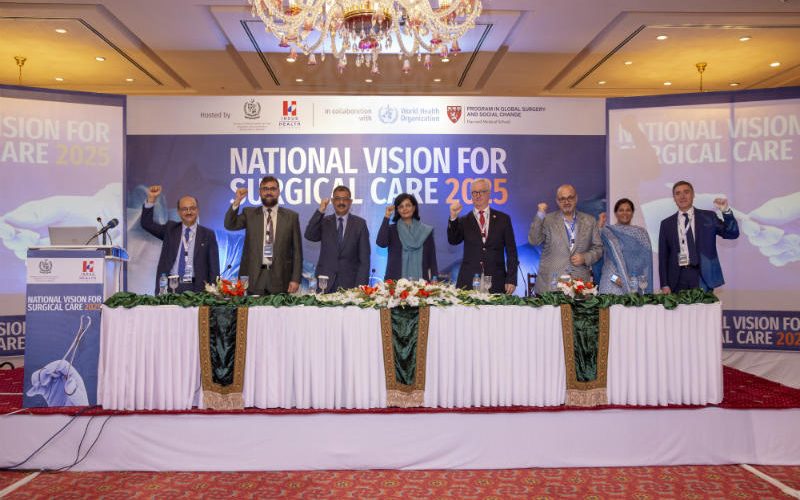INDUS HEALTH NETWORK JOINS HANDS WITH MONHSRC TO ORGANIZE NATIONAL VISION FOR SURGICAL CARE 2025
Islamabad, November 15, 2018: Pakistan’s premier health services institution, The Indus Health Network (IHN) has collaborated with the Ministry of National Health Services Regulation and Coordination (MONHSRC) and hosted the Stakeholder Engagement Conference for National Vision for Surgical Care (NVSC) 2025 today at Serena Hotel, Islamabad.
Additional Secretary for National Health Services, Regulations and Coordination, Iqbal Durrani inaugurated the NVSC 2025 Conference advocating the need for strengthening surgical systems in Pakistan and creating a roadmap which includes development of infrastructure, technical expertise and service delivery. The conference was attended by the federal ministries, provincial government departments, local and international surgeons, anesthetists and obstetricians.
NVSC 2025 Conference was led by the Indus Health Network in collaboration with the Ministry of National Health Services Regulation and Coordination (MONHSRC), with technical support from the World Health Organization and Harvard Medical School – Program in Global Surgery and Social Change. A steering committee of 25 local and international experts guided the process. The steering committee was chaired by Dr. Safi Malik, Director Programs-MONHSRC and Dr. Sania Nishtar, President Heartfile.
Globally 5 billion people lack access to safe and lifesaving surgical care. Majority of these individuals live in Lower Middle Income Countries including Pakistan. Moreover, 16.9 million people die from surgically preventable diseases each year and approximately 28-32% of the global disease burden is attributed to surgically treatable conditions. This includes childbirth complications, cancer related surgeries, surgeries that can improve vision – such as cataracts, heart disease related surgeries and much more. Additionally, unsafe surgical care can cause substantial harm and can create further complexities.
Commenting on the positive development in the medical arena of Pakistan, Dr. Assad Hafeez, Director General of MONHRSC stated, “To deal with this growing global health problem, member states including Pakistan signed a resolution at the 68th World Health Assembly in 2015 promising to strengthen surgical systems as an integral component of universal health coverage. Through this initiative, Pakistan will be the first Asian country to adapt a locally relevant version of this framework.”
John G. Meara, MD, DMD, MBA, Kletjian Professor of Global Surgery and Director of the Program in Global Surgery and Social Change and Professor of Surgery in the Department of Surgery, at Harvard Medical School said “Providing safe, affordable, timely surgery will save millions of lives and trillions of dollars in lost productivity. Agencies should play a critical role in integrating surgical care into health system strengthening and sustainable development if they want to achieve meaningful, long-lasting outcomes.”
Dr. Walt Johnson, MD, MBA, MPH, Head for Emergency and Essential Surgical Care Program at World Health Organization, and Clinical Professor of Neurosurgery at the Loma Linsa University Medical Center added “Most people assume that surgery is very expensive. But it’s been shown for a number of years that it’s actually quite cost effective,” He further added “To bring the 88 lowest-income countries up to the standard-of-care of middle-income countries would cost about US$ 420 billion over 15 years, which seems like a lot, but if you don’t do that, the total cost in disability and lost productivity would be more than US$ 12 trillion over the same time period – so it’s a very good investment,” Moreover he said “We need to see surgery as an investment, not a cost. It’s an important distinction.”
Speaking at the event, CEO of IHN, Dr. Dr Abdul Bari Khan stated, “The strategic approach for NVSC 2025 involves stakeholder engagement, situational analysis of current surgical system, consensus on a roadmap and eventual drafting of provincial surgical plans and their implementations”. He further said that, “As a next step, provincial plans will focus on implementation of frameworks through six domains which include infrastructure, service delivery standards, workforce, information management, finance and governance relevant to surgical care delivery.”
Through the NVSC 2025 Conference, Pakistan is working towards improving health strategy to ensure that adequate, lifesaving surgical care is universally available.




